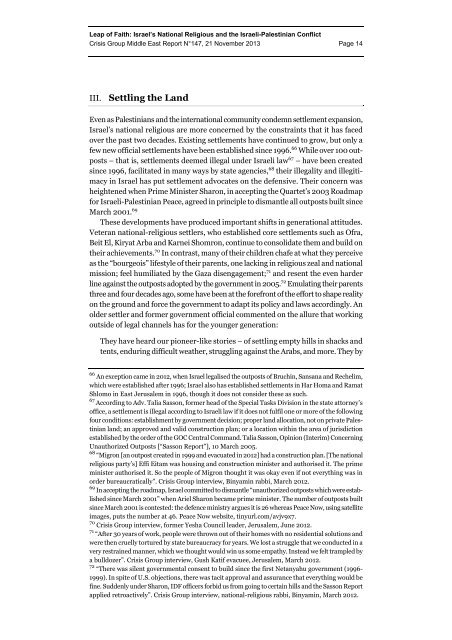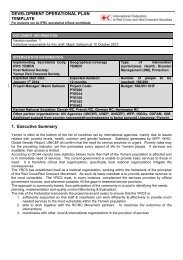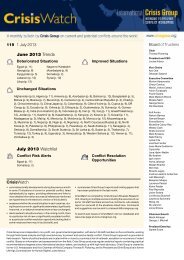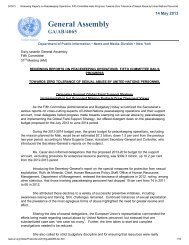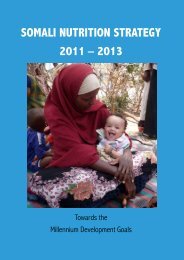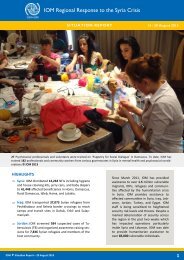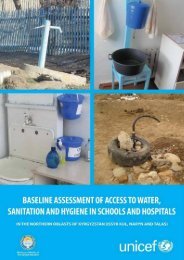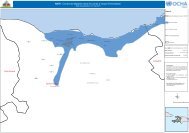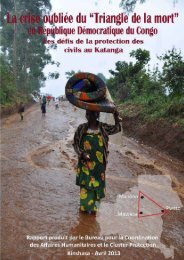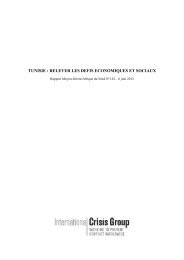Leap of Faith: Israel's National Religious and the Israeli ... - ReliefWeb
Leap of Faith: Israel's National Religious and the Israeli ... - ReliefWeb
Leap of Faith: Israel's National Religious and the Israeli ... - ReliefWeb
You also want an ePaper? Increase the reach of your titles
YUMPU automatically turns print PDFs into web optimized ePapers that Google loves.
<strong>Leap</strong> <strong>of</strong> <strong>Faith</strong>: Israel’s <strong>National</strong> <strong>Religious</strong> <strong>and</strong> <strong>the</strong> <strong>Israeli</strong>-Palestinian Conflict<br />
Crisis Group Middle East Report N°147, 21 November 2013 Page 14<br />
III. Settling <strong>the</strong> L<strong>and</strong><br />
Even as Palestinians <strong>and</strong> <strong>the</strong> international community condemn settlement expansion,<br />
Israel’s national religious are more concerned by <strong>the</strong> constraints that it has faced<br />
over <strong>the</strong> past two decades. Existing settlements have continued to grow, but only a<br />
few new <strong>of</strong>ficial settlements have been established since 1996. 66 While over 100 outposts<br />
– that is, settlements deemed illegal under <strong>Israeli</strong> law 67 – have been created<br />
since 1996, facilitated in many ways by state agencies, 68 <strong>the</strong>ir illegality <strong>and</strong> illegitimacy<br />
in Israel has put settlement advocates on <strong>the</strong> defensive. Their concern was<br />
heightened when Prime Minister Sharon, in accepting <strong>the</strong> Quartet’s 2003 Roadmap<br />
for <strong>Israeli</strong>-Palestinian Peace, agreed in principle to dismantle all outposts built since<br />
March 2001. 69<br />
These developments have produced important shifts in generational attitudes.<br />
Veteran national-religious settlers, who established core settlements such as Ofra,<br />
Beit El, Kiryat Arba <strong>and</strong> Karnei Shomron, continue to consolidate <strong>the</strong>m <strong>and</strong> build on<br />
<strong>the</strong>ir achievements. 70 In contrast, many <strong>of</strong> <strong>the</strong>ir children chafe at what <strong>the</strong>y perceive<br />
as <strong>the</strong> “bourgeois” lifestyle <strong>of</strong> <strong>the</strong>ir parents, one lacking in religious zeal <strong>and</strong> national<br />
mission; feel humiliated by <strong>the</strong> Gaza disengagement; 71 <strong>and</strong> resent <strong>the</strong> even harder<br />
line against <strong>the</strong> outposts adopted by <strong>the</strong> government in 2005. 72 Emulating <strong>the</strong>ir parents<br />
three <strong>and</strong> four decades ago, some have been at <strong>the</strong> forefront <strong>of</strong> <strong>the</strong> effort to shape reality<br />
on <strong>the</strong> ground <strong>and</strong> force <strong>the</strong> government to adapt its policy <strong>and</strong> laws accordingly. An<br />
older settler <strong>and</strong> former government <strong>of</strong>ficial commented on <strong>the</strong> allure that working<br />
outside <strong>of</strong> legal channels has for <strong>the</strong> younger generation:<br />
They have heard our pioneer-like stories – <strong>of</strong> settling empty hills in shacks <strong>and</strong><br />
tents, enduring difficult wea<strong>the</strong>r, struggling against <strong>the</strong> Arabs, <strong>and</strong> more. They by<br />
66 An exception came in 2012, when Israel legalised <strong>the</strong> outposts <strong>of</strong> Bruchin, Sansana <strong>and</strong> Rechelim,<br />
which were established after 1996; Israel also has established settlements in Har Homa <strong>and</strong> Ramat<br />
Shlomo in East Jerusalem in 1996, though it does not consider <strong>the</strong>se as such.<br />
67 According to Adv. Talia Sasson, former head <strong>of</strong> <strong>the</strong> Special Tasks Division in <strong>the</strong> state attorney’s<br />
<strong>of</strong>fice, a settlement is illegal according to <strong>Israeli</strong> law if it does not fulfil one or more <strong>of</strong> <strong>the</strong> following<br />
four conditions: establishment by government decision; proper l<strong>and</strong> allocation, not on private Palestinian<br />
l<strong>and</strong>; an approved <strong>and</strong> valid construction plan; or a location within <strong>the</strong> area <strong>of</strong> jurisdiction<br />
established by <strong>the</strong> order <strong>of</strong> <strong>the</strong> GOC Central Comm<strong>and</strong>. Talia Sasson, Opinion (Interim) Concerning<br />
Unauthorized Outposts [“Sasson Report”], 10 March 2005.<br />
68 “Migron [an outpost created in 1999 <strong>and</strong> evacuated in 2012] had a construction plan. [The national<br />
religious party’s] Effi Eitam was housing <strong>and</strong> construction minister <strong>and</strong> authorised it. The prime<br />
minister authorised it. So <strong>the</strong> people <strong>of</strong> Migron thought it was okay even if not everything was in<br />
order bureaucratically”. Crisis Group interview, Binyamin rabbi, March 2012.<br />
69 In accepting <strong>the</strong> roadmap, Israel committed to dismantle “unauthorized outposts which were established<br />
since March 2001” when Ariel Sharon became prime minister. The number <strong>of</strong> outposts built<br />
since March 2001 is contested: <strong>the</strong> defence ministry argues it is 26 whereas Peace Now, using satellite<br />
images, puts <strong>the</strong> number at 46. Peace Now website, tinyurl.com/avjv9x7.<br />
70 Crisis Group interview, former Yesha Council leader, Jerusalem, June 2012.<br />
71 “After 30 years <strong>of</strong> work, people were thrown out <strong>of</strong> <strong>the</strong>ir homes with no residential solutions <strong>and</strong><br />
were <strong>the</strong>n cruelly tortured by state bureaucracy for years. We lost a struggle that we conducted in a<br />
very restrained manner, which we thought would win us some empathy. Instead we felt trampled by<br />
a bulldozer”. Crisis Group interview, Gush Katif evacuee, Jerusalem, March 2012.<br />
72 “There was silent governmental consent to build since <strong>the</strong> first Netanyahu government (1996-<br />
1999). In spite <strong>of</strong> U.S. objections, <strong>the</strong>re was tacit approval <strong>and</strong> assurance that everything would be<br />
fine. Suddenly under Sharon, IDF <strong>of</strong>ficers forbid us from going to certain hills <strong>and</strong> <strong>the</strong> Sasson Report<br />
applied retroactively”. Crisis Group interview, national-religious rabbi, Binyamin, March 2012.


